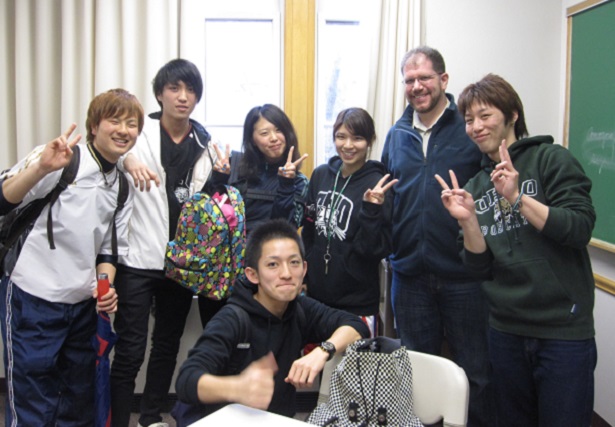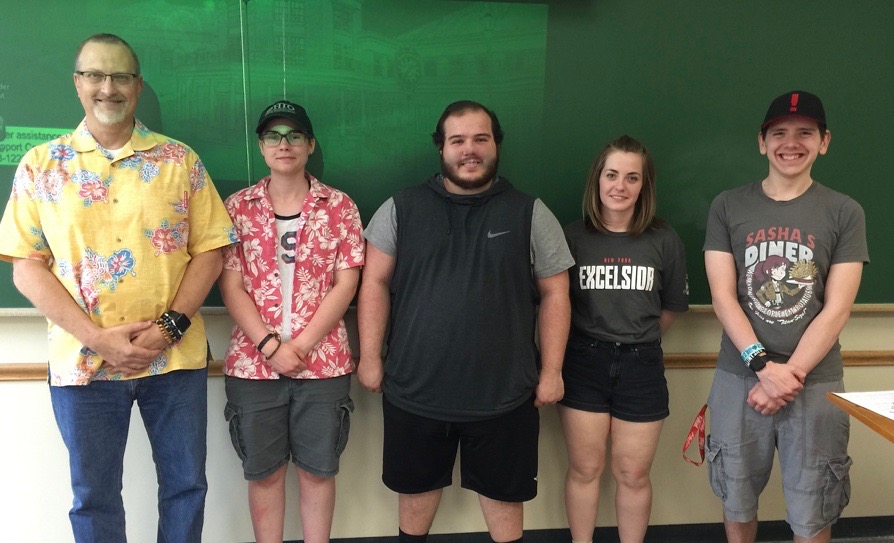OHIO alum Greg King and his students from Chubu University in Japan visit a linguistics class. From left: Takayuki Naito, Yuto Katano, Akino Taniguchi, Yugo Tajima (front center), Sachiko Sakurai, Greg King, and Yoshiyuki Uno.
Chris Thompson chose Japan’s communal baths as a lens through which students could study a culture different from their own. But when six Japanese students visited his class last week, the conversation also turned to pop culture commonalities in music, food and sports.
Students in the class “Japan: A Sociocultural Interpretation” (JPC 4500) are reading the book Japan, A View from the Bath and studying the important social role of the sentō, or communal bath house, a tradition more than 700 years old. Thompson, Associate Professor and Chair of Linguistics in the College or Arts & Sciences, switched back and forth between Japanese and English as he introduced the visiting students to his class.
While U.S. students have grown up with private baths and social modesty, nakedness in bathing has been part of emotional socialization in Japan, a concept call skinship. “This is a topic that isn’t historically dealt with in a traditional American Japanese culture class. However, the bathing experience and this concept are both important to teach and talk about in order to help non-Japanese understand how Japanese relate among themselves,” Thompson said.
The visiting Japanese students role-played a bathing scenario for the class and also acted out several other social situations, including the relationship between a boss and an employee and a scenario involving friends deciding where to go to dinner. Contrasting with the popular U.S. sitcom of loud banter, Japanese culture emphasizes quietly avoiding confrontation. “As demonstrated in the skits, conflict and confrontation is avoided in Japanese culture by avoidance of saying no,” Thompson said.
Breaking into small groups where the Japanese students could practice their English with the U.S. students over ice-breaker questions, the students quickly found shared interests, from gymnastics to favorite music. “He’s a little bit crazy,” one Japanese student said, laughing with a student in her small group.
The Japanese students also joked with their sensei, Greg King ’96, ’99 , an Associate Professor at Chubu University in Japan and an alum of the Linguistics Department, where he earned both a bachelor’s and a master’s degree in linguistics.
When Thompson asked if King was a strict English professor, one student offered a quick “no” but then laughed. When the students posed with King for a photo, they held up peace signs.
“Some of the U.S. students already have traveled to Japan to help in the tsunami recovery volunteer effort, and others plan to go to Japan on our next trip,” says Thompson. “So we’re making new friends whom we will visit this fall.” Thompson noted that OHIO students who participated in the first (fall of 2011) and second (fall of 2012) tsunami recovery volunteer effort also were taking the class. “It’s important for all of us to know each other.”
The six students who visited Thompson’s class were part of a larger group of 79 students from Chubu University who arrived at Ohio University just after spring break to begin a three-month study abroad experience at the Ohio Program of Intensive English, known as OPIE, a unit within the Department of Linguistics.
Thompson, who grew up in Japan, has been doing fieldwork on the northeast coast of Japan for 25 years. He is part of an Ohio University economic development contingency headed to Japan in April with Executive Vice President and Provost Pam Benoit and Vice President for Research and Creative Activity and Dean of the Graduate College Joseph Shields.




















Comments